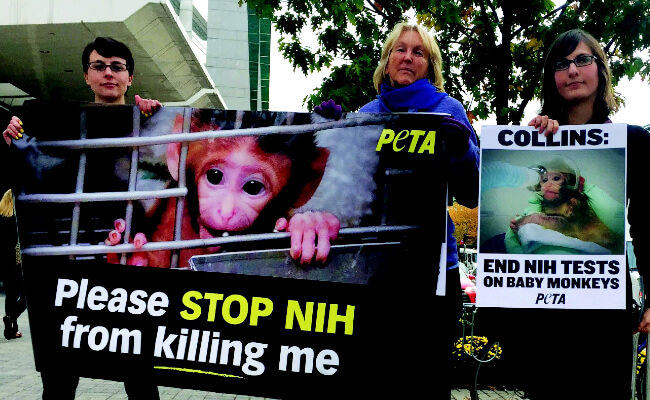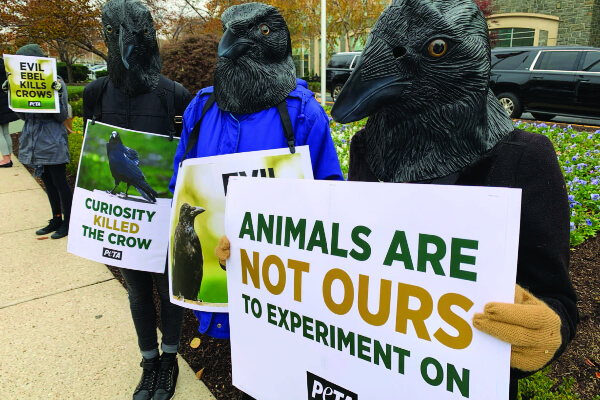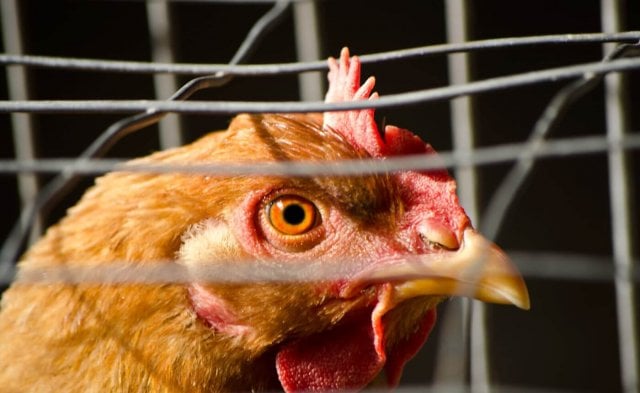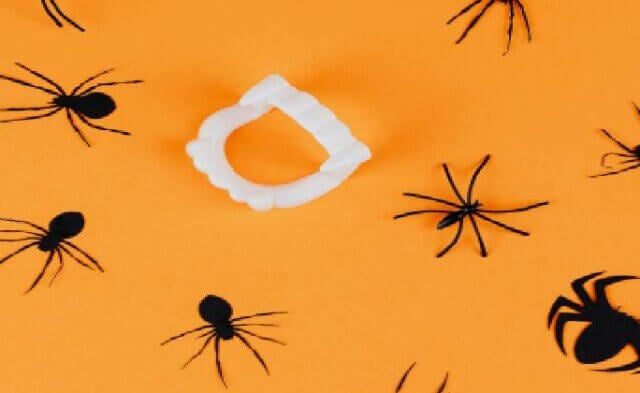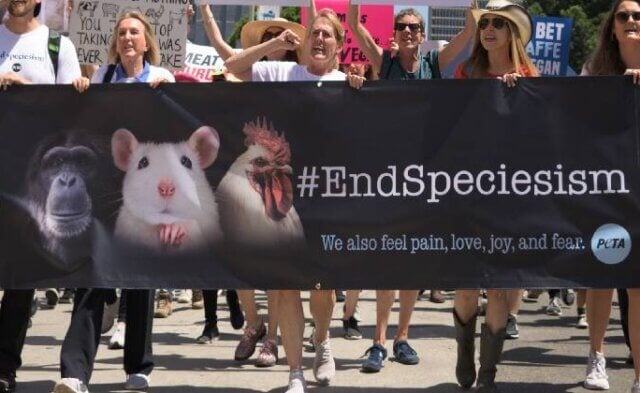This article was originally published in PETA’s Augustus Club newsletter. PETA’s Augustus Club is a complimentary club honoring those who are leaving a legacy for animals through a planned gift to PETA. If you have made a planned gift to PETA, please let us know so that we can thank you! If you have not yet left a legacy for animals but would like information on how to do so, please contact us.
As you know, investigations are the lifeblood of PETA’s work. We uncover animal abuse that people unwittingly support, so that it can be stopped. Sometimes we obtain proof of the abuse by placing a PETA eyewitness on site at a facility where it’s occurring. Sometimes proof comes from whistleblowers. And sometimes we discover it by researching public records, such as those of taxpayer-funded laboratories.
The Freedom of Information Act (FOIA) and other public records laws enable us to thrust into the spotlight many of the sordid goings-on that animal experimenters so desperately want to keep under wraps. And with the support of our Augustus Club members, we wield these tools skillfully and powerfully for animals. This enables us to give crucial information to taxpayers who would otherwise not be able to hold officials accountable when laws have been violated, animals have suffered, and public money has been misused.
Experiments Stopped Following a PETA Public Records Lawsuit
Some truly hideous experiments on monkeys were stopped after we sued the University of Massachusetts–Amherst and got the records that we demanded.
Here’s what happened: In 2017, we filed a records request for videos related to experiments on monkeys overseen by UMass–Amherst experimenter Melinda Novak. The request was denied by the public university, so we filed a lawsuit in March 2019.
Since 1990, Novak has received more than $10 million in taxpayer funding to study how and why monkeys mutilate themselves in laboratories. But we already know why they do this: It’s because they’re stressed out of their minds. After we filed suit, the university agreed to settle the case and hand over copies of all the videos.
The footage that we obtained and released showed monkeys in small metal cages pacing endlessly, tearing out their own hair, and even poking their thumbs into their own eyes. As mentioned, the purported purpose of the studies was to see how imprisonment in laboratories harms monkeys. But decades of these experiments—all showing that monkeys are traumatized and driven mad in laboratories—led to zero changes that would benefit them.
But now, Novak no longer harms animals. After more than 30 years of conducting and overseeing experiments like these, she quietly retired after our lawsuit was filed.
We also pressed Oregon Health & Science University (OHSU) to turn over damning video footage of taxpayer-funded experiments. The school refused to comply, so we sued. As a result, we not only forced OHSU to turn over 74 videos from “junk food” experiments on infant monkeys but also demolished its already tattered reputation by garnering media headlines such as “Oregon lab … turning [pregnant monkeys] into nicotine and alcohol addicts.”
Unlocking Cages With the Public Records Key
Our success in prying public records from the vice-like grip of vivisectors is also sparing dogs the ordeal of painful experiments at Texas A&M University. Cruel and useless canine muscular dystrophy (MD) experiments have been conducted there for nearly four decades without producing a single cure for the disease or even a treatment to reverse its symptoms.
We’ve put massive pressure on the school, including by filing a ground-breaking First Amendment lawsuit, conducting ad blitzes, disrupting its Board of Regents meetings, holding protests, and engaging in takeovers of its football games.
These actions led Texas A&M to stop breeding dogs to develop canine MD so that they could be used in these experiments. The lead experimenter has now retired, and dozens of the dogs have been adopted into loving homes.
And in our most recent victory against the university, three more dogs who were caged and subjected to inhumane conditions there have been freed!
Additionally, when we asked our Augustus Club members and other supporters to demand the release of Lucilla and Varinia, two healthy 9-year-old German shorthaired pointers who were exploited for breeding purposes for years by Texas A&M, thousands of you sent e-mails and made phone calls. Because of that, the dogs have been adopted, according to records that we’ve received. And in more good news, a golden retriever named Cheddar has also been adopted.
With your support, we’re working to free the remaining 20 dogs still trapped at Texas A&M.
Slashing Funding, Yanking Licenses, and Changing Laws
After we obtained public records revealing Colorado State University’s horrific experiments on birds—many of whom were illegally wild-caught—we went into attack mode. CSU experimenter Gregory Ebel has spent 13 years capturing wild crows, robins, and other birds, imprisoning them in his laboratory, infecting them with West Nile virus, and killing them—but he’s failed to develop a cure, a vaccine, or any clinical treatments for the disease caused by the virus, either for birds or humans.
In response to complaints from PETA, the National Institutes of Health (NIH) ordered that its grant money be pulled from all experiments involving the illegally caught birds, and Colorado Parks and Wildlife cited and fined Ebel and suspended his license.
And here’s another victory involving our public records sleuthing skills: After PETA and a whistleblower exposed a local animal shelter’s practice of selling both live and dead dogs to Louisiana State University’s veterinary school for use in deadly classroom training exercises and experiments, Louisiana passed a historic law. The state now bars shelters from selling live animals to laboratories for experimentation and prevents them from accepting homeless animals for the purpose of killing them and selling their bodies to laboratories. It’s hard to fathom that this was occurring, but it was. Thankfully, it has stopped.
Winning the Fight for Government Transparency
In addition to requesting public records, we also keep tabs on those who chronically violate the federal Animal Welfare Act (AWA) by monitoring the records of their inspections by the U.S. Department of Agriculture (USDA). This agency, which is in charge of enforcing the AWA, inspects laboratories, roadside zoos, circuses, puppy mills, and other animal-exploiting facilities.
For years, the USDA posted its inspection reports on its website, which was vital to our ability to identify and take action against AWA violators and has been critical to our success in shutting down animal laboratories and rescuing dozens of tigers, bears, and other animals from shoddy roadside zoos.
But in 2017, something terrible happened: We faced an information blackout. The USDA scrubbed from its website almost all the crucial information that was once online, including the number of animals held at each facility and the citations of abuse and neglect. This meant that thousands of animal exploiters were able to shield their AWA violations from our scrutiny and from the public.
But with the support of our Augustus Club members, we stopped the secrecy. A PETA-led coalition sued the USDA to compel it to restore those vital records. In addition, we applied tremendous public pressure—including by generating e-mails from thousands of our supporters—and that prompted Congress to take action. The records are now back online! This is an enormous victory for animals and for the public’s right to ensure that the AWA is enforced.
You’re Our Secret Weapon
The use of animals as “models” of human physiology to study disease has proved time and again to be scientifically unsound. More than 90% of animal experiments fail to lead to treatments for humans. And yet every year, billions of tax dollars are wasted on misleading experimentation. Please contact your lawmakers and politely urge them to stop throwing taxpayer money away on cruel, useless animal experiments and instead direct it toward modern, non-animal methods of research, such as epidemiology; cutting-edge, human cell–based techniques; and advanced computer modeling.


